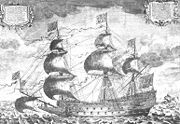Wars at sea: the ships of the line.
by Han
(Brittany, France)

Sovereign of the Seas
With the introduction of cannon aboard ships, see: http://en.wikipedia.org/wiki/Naval_artillery_in_the_age_of_sail, the tactics changed from random clashes and boardings between armed merchantmen to neatly choreographed line-dances in which ships of the line gave each other hell from some distance: http://en.wikipedia.org/wiki/Ship_of_the_line, and:
http://en.wikipedia.org/wiki/Line_of_battle.
History, a wise historian remarked, is written by the victor. That is why most of us have a romantic view of life at sea in the ages of sail, a view further hammered into our brains by movies and books. In reality, this life was a grim one, characterized by uncertainty, hunger, blood and death.
Even the great discoveries were made by men who never knew if they would return home. Compared to that "our" travels to the moon are mere bustrips with some risk.
I'll give you an example of twisted history-writing by the Dutch. At school I learned about "the Raid on the Medway" in 1667, where lieutenant-admiral Michiel de Ruyter, after heavy fights with the English Royal Navy, captured the English flagship Royal Charles and sailed it in triumph to Holland.
Only recently a Dutch historian studied de Ruyter's diaries and found out this "feat" to be of a slightly different nature. The truth, as described by the Ruyter, a true hero of the Dutch navy comparable to the English Horatio Nelson:
A Dutch fleet was there, commanded by de Ruyter and accompanied by a politician, Johan de Witt.
Knowing that the bigger part of the English navy was, lightly guarded, laid up in Chatham on the Medway, they wanted to use this opportunity.
However, the wind was south-westerly and so their
goal was dead upwind. De Ruyter didn't want to risk his ships on the narrow, shallow Medway in these circumstances, so it was decided de Ruyter would stay with the big ships at the mouth of the river, while de Witt went upstream with some yachts, shallops and a body of marines. Arrived at Chatham some shots were exchanged with the guards upon which the guards fled.
A big part of the English fleet was set on fire, the Royal Charles was boarded and taken. So the Royal Navy was put to shame and the whole affair disappeared under the carpet in England, while in Holland it was blown up far out of proportion.
Only de Witt's role in it was, for political reasons, downplayed while de Ruyter got the credits. That's a lesson in history, isn't it?
See also: http://en.wikipedia.org/wiki/HMS_Royal_Charles_(1655)

